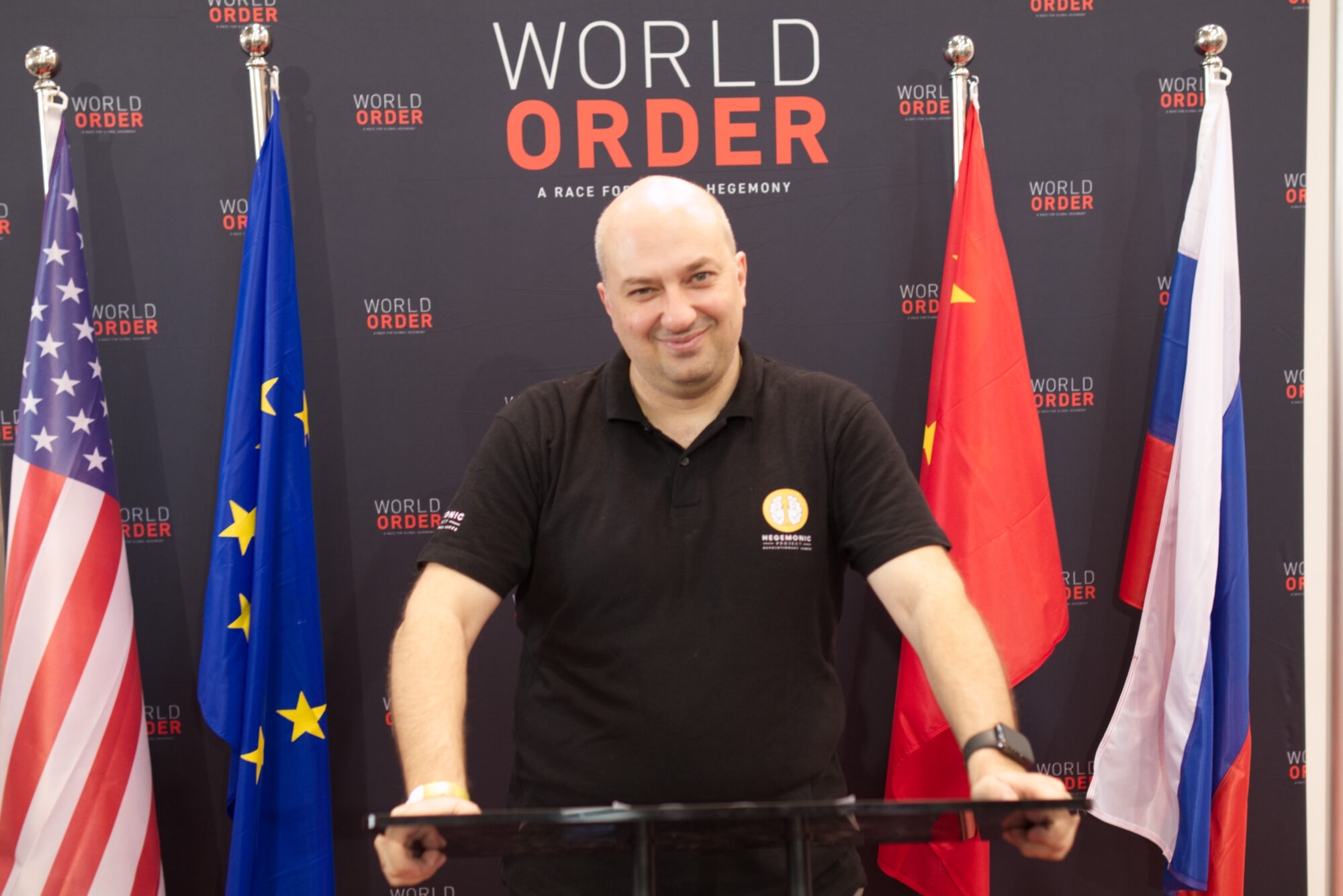One of the things I was most looking forward to going to SPIEL Essen 2024 was to once again be able to chat with Vangelis of Hegemonic Project Games … and demo their upcoming Kickstarter World Order of course! Vangelis and me had talked for Origin Stories: Hegemony as well as did an impromptu interview when World Order was announced at SPIEL 2023. Coming from the much too overburdened Mr. President by GMT, I’ve been looking forward to how Vangelis and Varnavas would try to make international politics approachable, similar to how they did economical and political class-interaction for their hit game Hegemony.
For context, I had played World Order two days before for about an hour as that was the allotted demo slot. You can find a description of that experience in SPIEL Essen 2024 – Day 1: World Order, Landmarks, and a Sold Out Show. I was mainly interested to hear Vangelis thoughts on how the success from Hegemony had impacted World Order’s design and talk with him about the similarities and differences I noted between the two games.
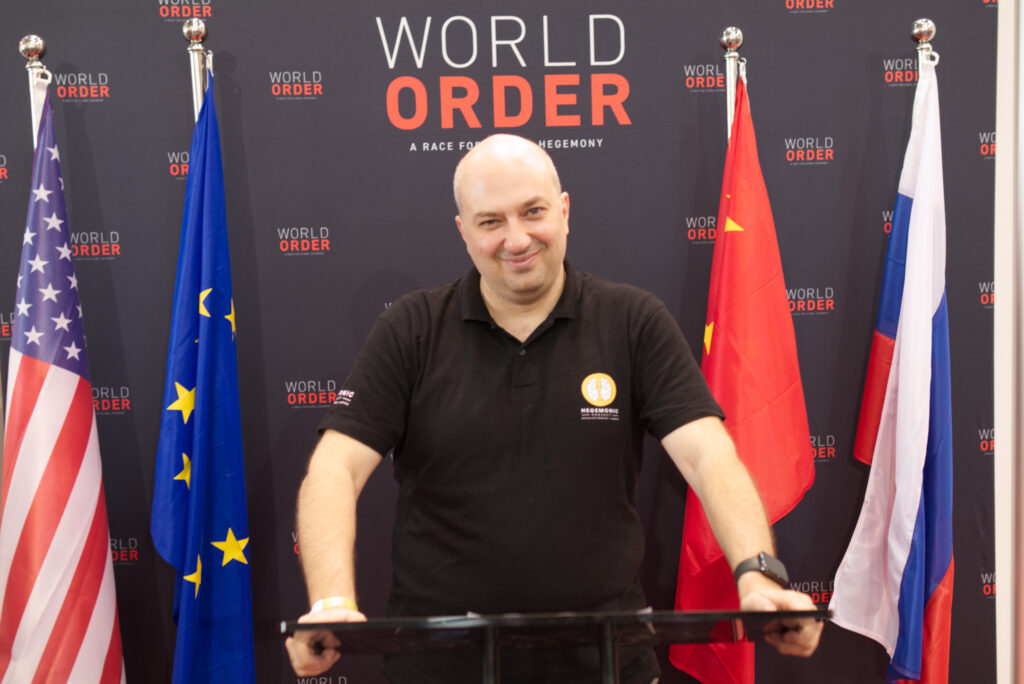
When we talked about World Order last year, you were telling me how you already had the game, the basic idea and core principles, but that based on the great reception of Hegemony, you were thinking about adding more complexity, how to still be able to keep the playtime shorter but give like a meatier experience [than what you had originally planned]. So how has World Order turned out? What new things did you introduce? What are new mechanics in it?
There is a saying in game design: what separates a good game from a great game is playtesting. And the more playtesting you do, the more it ends up showing in the game. This is actually what happened. We had the game – which was decent enough – but we knew it could be improved. So what we did even after the fair was we playtested it more. We were not afraid to add a few more things to make it slightly more complicated and that’s what we did. For example, there were playtest sessions where we were playing something and one of the comments was “you should put more gaming to that part”. So we actually did that. We started introducing some new things, like the focus decision that you do at the beginning of the round, which was super interesting and added a lot to the game.
[Context: at the start of the round, each player can choose whether their power will focus on domestic, diplomatic, or military issues. That not only has effects on how many exhausted allied countries can be re-activated in that round but also what types of advanced resources can be produced and more. So the impact of this decision for a given round is quite huge.]
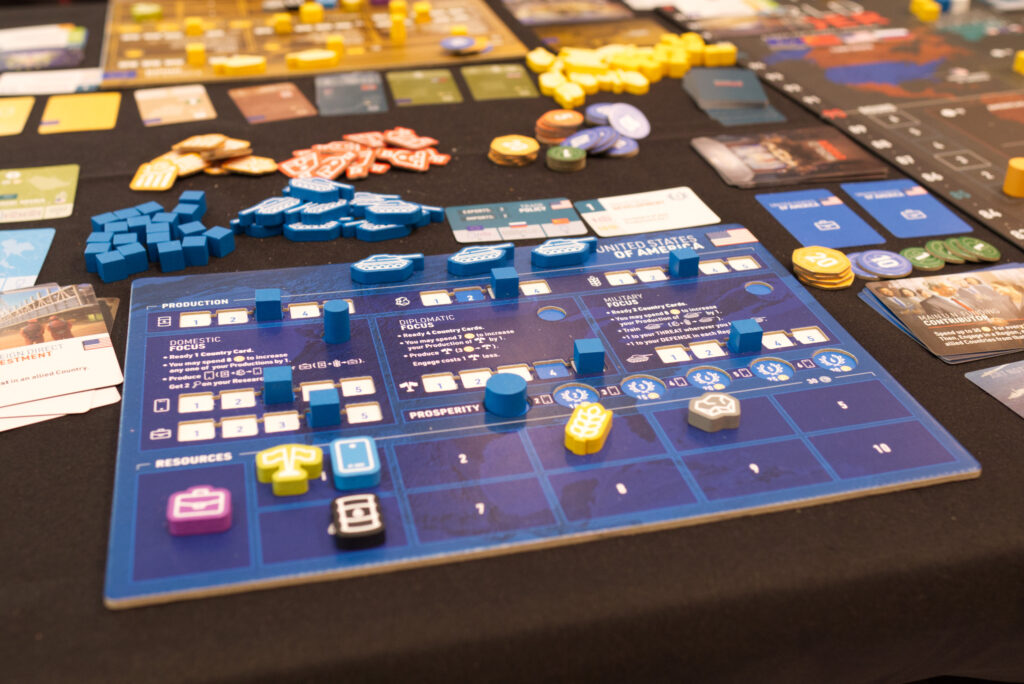
We also created this mechanism where when you add [influence] cubes on the board there are now two separate sections for each region on which you can place your cubes. One where they are permanent and one where they are only temporary [but provide more points]. It adds a very interesting dilemma, a very interesting choice to this [element of the game]. I’m putting an influence in that region but I need to think ahead: do I just want the points here? Am I close enough to scoring so that I can have a high chance of my cube staying there? Or will my cube go away before scoring?
[Context: in the area majority element of World Order, permanent spots to place influence cubes usually only bring a single point of influence where temporary ones can bring up to 5 points! However, if all temporary spots are occupied, anybody adding a new cube of influence will push out an existing one, making exact timing crucial and early overcommitting dangerous.]
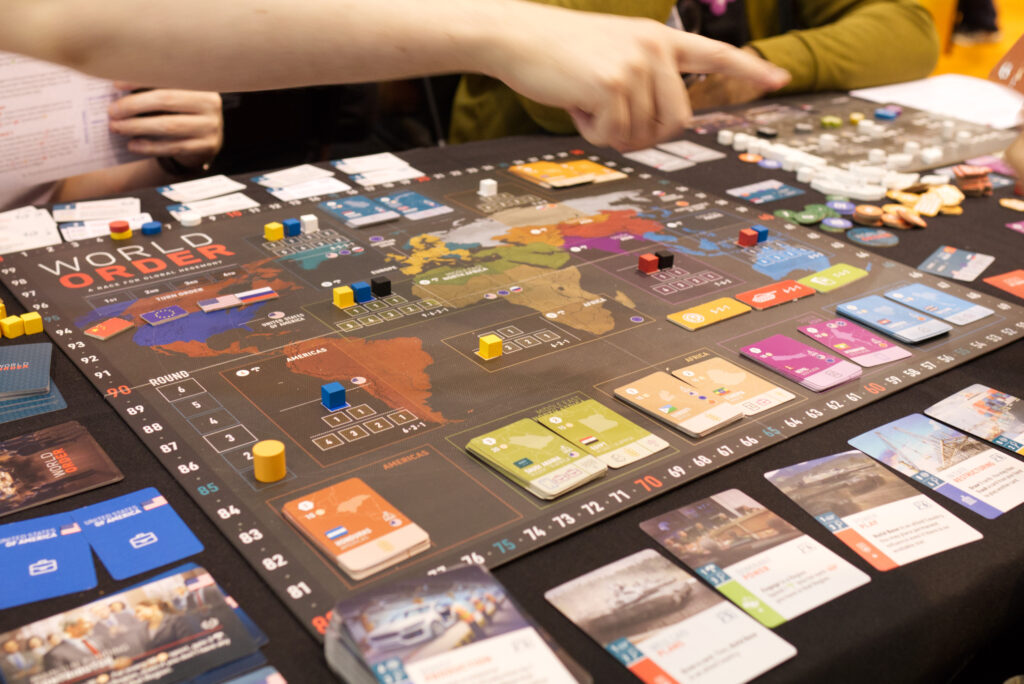
One of our very recent additions was the turn order. [Initially] it was more linear, like you choose a player, you go clockwise, something like that. But we realised that there were people who would end up playing last every time. Since we’re scoring at the end of the third and the sixth round, the same player would play last, the same player would be first, and that was kind of odd. We explored some options and we realised that there are cases where you want to be first and there are cases where you want to be last. So why not give the players the option of that? We introduced the whole concept where at the beginning of every round basically the player who is further behind on victory points gets to choose [their place in turn order first]. If they want, they can be first, if they want, they can be last. And that matters a lot during gameplay!
What’s a good example of something where you don’t want to be last?
As first player you have the choice of which allies you want to get. Why do you want to be last? Because you get to place your cubes last. Especially if it’s a scoring round where majorities matter, you want to see what the other players will do first and then kick them out. So for example if I’m tied with you in three regions, I may want to see where you’ll go so that either I make sure that I win the other ones or that I make sure to add where you added so that I’m tying with you or I get more than you and so on.
Also – not only on scoring rounds, in other rounds as well – we have the concept of “threat”. At the end of the round, we check to see where the armies are and who has more armies in each region. I may want to play last so – as a surprise move – I can move my armies there and cause you to lose points based on that. On the other hand I may see a very good card in the market and I want to be the first one to buy it. Or I may want to enter a region and score the high points there and I want to play first in order to be the first one to do it because I realise that you are about to move to the same region. So you have both cases and it’s good that the latest mechanism allows for both of these to happen.
In your experience, what’s the play time like right now? Is it still two and a half hours?
[Vangelis laughs] No, we’ve actually moved a bit away from that. So we are around three hours, three and a half hours. That’s where we’re more close to now. As it usually happens, your first game will take a bit more but with more experienced players, think like three, three and a half hours.
When my demo group played it, we all felt the turns were somehow snappier. As if one can more focus on what one wants to do. But then I was also thinking, yes, for some things it actually takes a little bit of time [until it’s my turn again]. That was why I was wondering if you were still able to hit the two hour mark.
No, no, it was not possible. With Hegemony, we had rules-complexity. You had to learn a lot of things in order to understand what’s going on and play. Here, the rules are simpler but you have bigger board complexity. You have a lot of decisions to make: where you place your cubes matters, like do I go here, do I go there, and especially in the last round you have players thinking “oh no, what do I do? Do I need to do this, do that?”. So there is more – let’s say – complexity in the way you have to think on what to do.
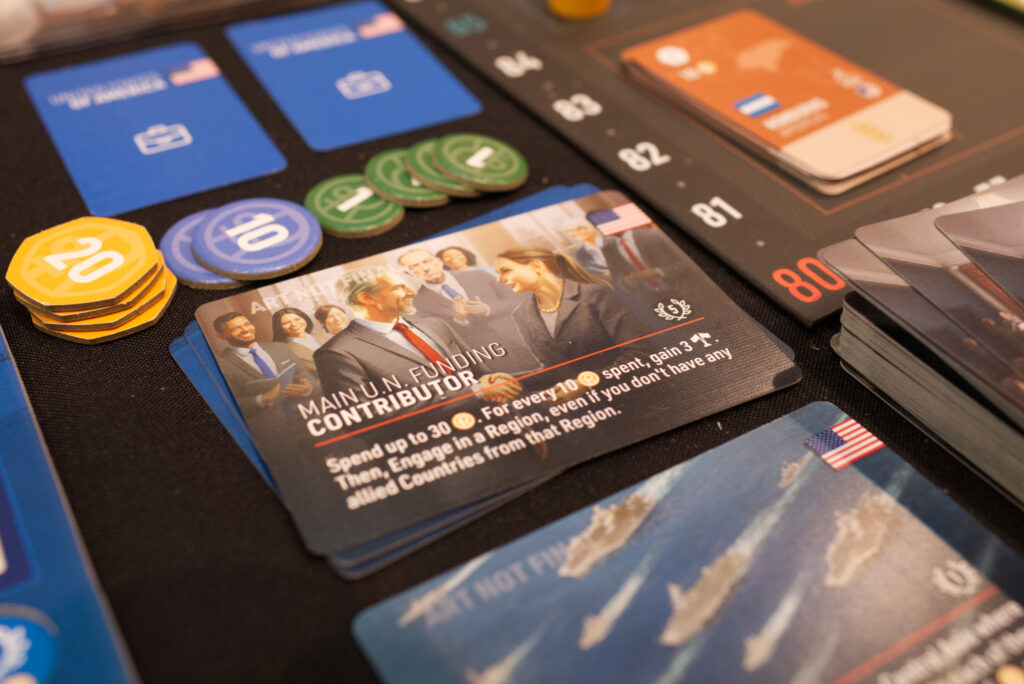
Let’s talk about the biggest changes comparing World Order to Hegemony. It’s two very different games, but there’s a common DNA in the graphics and so on. You still have action cards, but all players can purchase the same action cards. It’s no longer like each faction has their [completely separate] deck. How do you do the theming in there? If everybody [has access] to the same cards, what are the subtle things you put in there so every player has to play their own game?
Even though the cards in the market are the same, the cards in your starting deck have differences. First of all, even the exactly same cards have different artwork. So you can see the cards of the Chinese player depict images of Chinese government, Chinese politicians, military people. Similarly, for the US Army or European Army, we’ve paid attention so that the artwork corresponds to the starting deck. Also, there are some cards that are unique to each player and there are different cards which no other player has in their starting decks. Apart from that, there’s also this smaller deck, the Strategic Asset cards, which have very thematic actions that you can do, which are only applied to you as a player.
Using those things helps a lot to evoke the theme and makes you feel like you are [that power]. Especially with deck building games, even small changes in the starting decks can lead to very different gameplay. So even by adding one or two cards in the Chinese deck, the starting deck has like two more economic cards. Yet this leads to the Chinese player playing more economically. Similarly, the European player will play more diplomatically because they have two more cards about diplomacy. So even those small changes lead to very different gameplay and you get to feel different depending on who you play.
When we started out, we were all thinking analytically like gamers: okay, we all [play by the same rules], we all have a similar looking player board. It took us a bit of time to realise we were playing a slightly different game. For me as the US player, it was like: okay, this is easy, this is easy, like where’s my theme as the US? And then I looked over at another player’s board and I realised, I could push up my oil production, but the EU player couldn’t. And there were multiple things where we were all noting how slowly the [theme came through] and we would know what we were supposed to do. With Hegemony it was really in your face with the action cards.
Yes, because each player had their own unique deck and Hegemony was mostly driven by the cards. The cards would guide you and they would give you the options. In Hegemony you had – let’s say – more limited choices on what to do but you had to react to what the other players were doing a lot. So every game would change drastically because of the things that the other players would do.
[In World Order,] you can plan more easily ahead but you are more open in what you can do. There are seven regions on the board. You can pursue all seven, although you quickly realise that for you it’s easier to pursue some specific regions. You realise that for some countries it’s easier to invest than others. For the USA, it’s easier to build bases in other countries. So after playing, these things come up and they help you understand international relations better, which is ultimately the goal of the game. To show you why, like for example, the US behaves the way it does in real life, why China behaves the way it does.
[Context: each power starts out with a small set of allied countries, represented by small-format cards that show that countries potential import and export resources. They also get important as some allow building bases, but only for certain powers. Except for the initial starting allies, all other allies have to be picked up from a common market via the diplomatic action, one of the cards that is present in every players starting deck but to a different degree.]
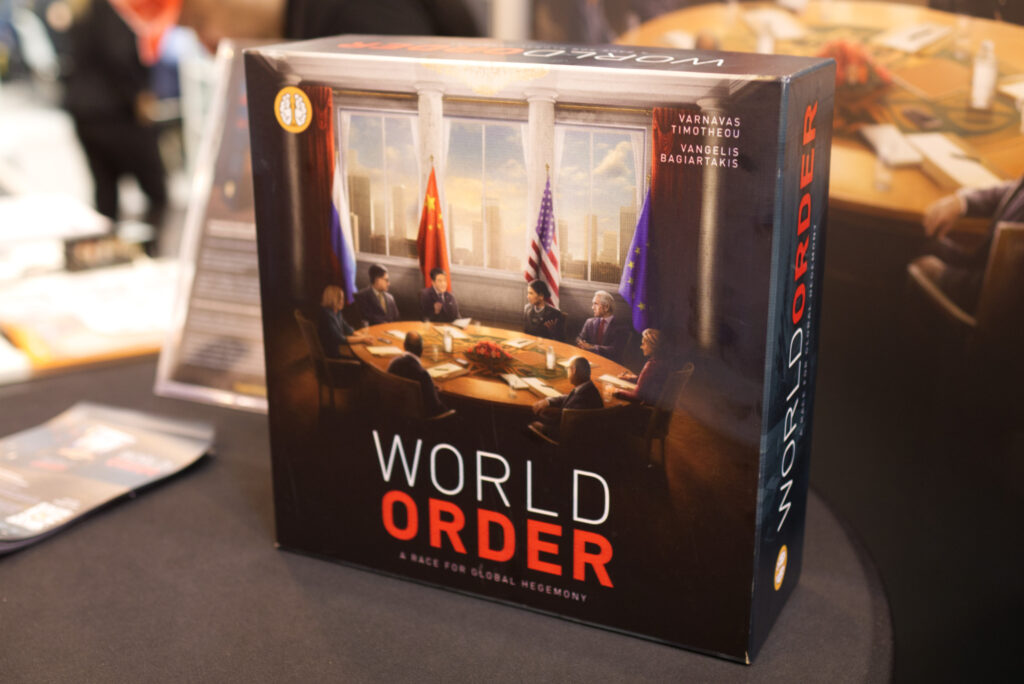
We have cards like the “Belt and Road” initiative, which you may have heard about on the news. By playing the card in the game, you realise “so that’s what China is doing!”. It’s investing and adding more influence and helping itself. So these come through while you play and basically that’s the goal of the game: to show you how things end up.
So in my game a probably typical thing happened: The EU had problems getting oil so they imported it from Russia. [Vangelis laughs knowingly] We were doing it and it felt natural because the EU production track for oil is so very limited. We were doing it as gamers playing an area majority game of economics. And then we suddenly all looked up and were like: ha, interesting, that’s happening in reality.
How much was it your plan to give players clear guidance how to play their faction and h ow much was it your plan to say, just go for it and discover yourself in what necessities you are in?
So usually people say that there is a debate between theme and mechanics. Even with Hegemony, Varnavas and me had these discussions like “are we using this mechanism? No, it’s not thematic, it doesn’t tie to the theme” and so on. With [World Order], we realised that there is a second level, a second dilemma if you like. On one hand, you have forcing the player to play as in real life versus letting the game be completely open and let them do whatever they want but behaving in a way that’s not very thematic. Like for example we had a game in playtests some time ago where the US tried something completely different than other players and they scored a lot of points but what they did didn’t feel like the US at all. So they would just score some quick points here and there, didn’t care if they were first in any region, they didn’t play very militaristically.
On one hand, it’s good to allow the players to do things they like. On the other hand, you want the players to evoke this theme, to make a player feel like they are the US. So we had to change a few things, but not too many, to find the sweet spot between these two cases. You want the player to have some freedom to explore different options, but you also want them to get a feeling when they play that, okay, I’m playing as the US, so what I do makes sense as the US. That was a hard thing to do, to try to find that specific balance.
We think that we’re in a good spot with it, but this is what our latest tests are about. So right now we’re doing mostly balancing, making sure that every faction works well, that they can score as easy as the others, that they have an equal chance of winning as everybody else.
Give me a sense of your experience from playtesting. What were some favourite moves you have seen? Moves where you were really like “I love that the player did this”. Or more advanced strategies the players used?
So it depends. Usually you will see some player building up to something. Through deck building, you can buy new cards for your deck and some cards are quite powerful because they allow you to do two different things in the same action. And by some combination, you could use that to manage to add like two cubes in one region at the same time. So you push somebody out, you manage to get better yourself, and then perhaps combine it with something else and put additional influence over two other regions.
You’re not going to have one move where you are going to change the entire board. But we’ve seen cases where someone steadily built a position where they were able to buy two consecutive actions, do something really powerful, and take over the game. And for some of those strategic asset cards, this is what they ultimately do. They allow you to do something powerful that the other players are not able to do, and you just have to find the proper time for that and to build to make sure that you have the necessary resources to use that ability to your advantage and come on top.
[Context: the strategic assets cards are a small deck that exists personalised for each power and of which only a subset is used per game. They can be activated as one-time effects that benefit that player in some faction-appropriate way and give them a big boost if employed and timed correctly.]
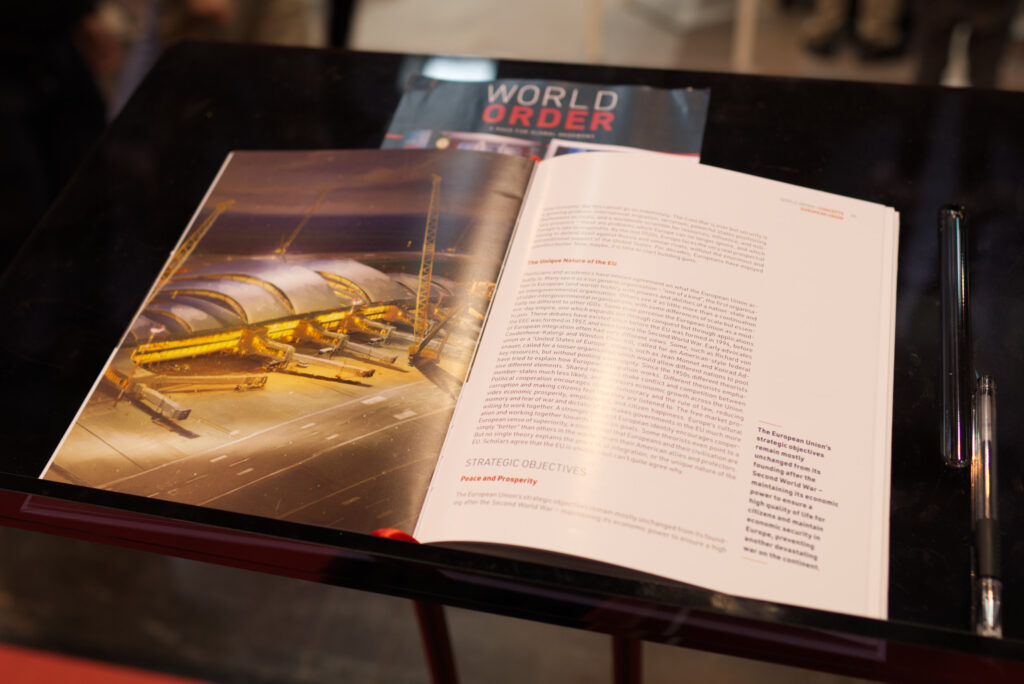
Just to make sure people are aware this time: again the campaign will come with an accompanying book explaining all the background. I remember a lot of people missed out on that and later asked me if they could get it somewhere. Will the book also be sold separately or will it just be part of the campaign?
We’re once again going to have it as a Kickstarter exclusive. What we did with Hegemony is that we made the content available online. If you visit our website, you will find what was inside “Concepts” even though you cannot buy it outside from Kickstarter or conventions like this one. We’re probably going to have a similar approach with the new concepts booklet. So we want players to join the Kickstarter and that’s where they will be getting it for free. Later on after all the backers have it, we may end up uploading some of that content online. We care about the company, but we also want to help educate people about topics. So having that information available is also important. Once again we’re looking for the balance between these two.
When is the Kickstarter coming?
Early November, November 12th, around that time is what we have in mind right now.
And any rough plans for a fulfilment date?
Probably during the summer, late summer next year, something like that. It depends because a lot of things can change between now and then but we’re looking at late summer of 2025.
Nice, very much looking forward to it.
Thank you.
Disclaimer: As always, I cleaned up the phrasing and wording to improve readability. After all, this was a 15 min impromptu conversation in the middle of a very noisy convention. Any errors are likely mine as editor, not Vangelis’.
When I talked with Vangelis a couple of months ago for Origin Stories, we ended up talking for two hours and I could likely have gone on for two more. Here it was very much the same, there were so many interesting elements in World Order. I’d also loved to just stay at their booth and play the full game in its current iteration, but with limited table space that of course wasn’t possible. Still, I’m very much looking forward to the day when I’ll be able to dig deeper into World Order. Having been able to get a teach and playing one demo round of course wasn’t nearly enough to say how good the final product will be, but let’s put it this way: they’ll definitely have my money!
On the new concepts book: I quickly leafed through it and it absolutely looked gorgeous. They had a hardback and a paperback version, the latter being similar to the concepts booklet of Hegemony. It looked absolutely gorgeous and if they would have allowed me, I would have bought that pre-production copy of the book off their hands in a heartbeat.
Once again thanks to Vangelis for his time. You can find out all about Hegemonic Project Games and their two games Hegemony and the upcoming World Order at hegemonicproject.com
